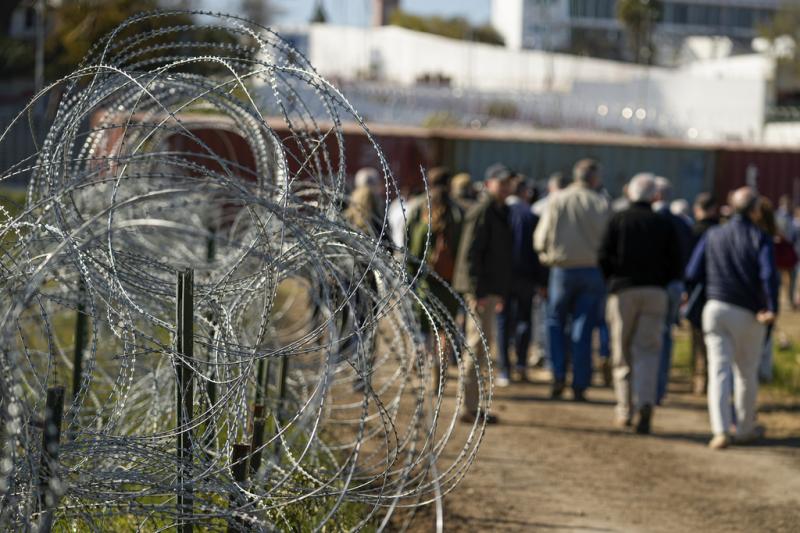What's next in the Texas border wire legal battle?
By: Kaelan Deese



Advocates for Texas's efforts to place razor wire fences along the southern border say an appeals court should soon pave the way for such efforts after the Supreme Court ruled federal border agents could cut through them earlier this week.
The U.S. Supreme Court on Monday delivered a striking blow to Texas Gov. Greg Abbott (R), who has sought to use his border security program "Operation Lone Star" to block migrants from illegally entering the country. Through a 5-4 vote with no comments, the justices overturned a lower court injunction that permitted Texas to maintain miles of such fences around the southern border, siding with the Biden administration's bid to allow federal Border Patrol to cut the wire fences.
Robert Henneke, executive director and general counsel for the Texas Public Policy Foundation and former state assistant attorney general, said the Supreme Court's decision amounted to "upending" the legal process without any justification, adding, "I think it's an abuse of discretion."
Abbott doubled down Tuesday and said state forces, deployed to the border since 2021 under Operation Lone Star, would continue to remain on-site despite the highest court's ruling.
"The Texas National Guard continues to hold the line in Eagle Pass," Abbott said in a post to X Tuesday afternoon. "Texas will not back down from our efforts to secure the border in Biden's absence."
The high court's decision on Monday won't be the final word on the contentious dispute, which has become a grave matter in recent weeks as Texas and the federal government stand at odds over how to mitigate the immigration crisis that has seen record levels of illegal immigrants over the border since President Joe Biden took office.
In summary, the legal challenge stems from Border Patrol agents who argue the barriers block agents from carrying out arrests on immigrants who enter the country illegally and claim the wire only obstructs efforts to administer aid in emergency situations.
Texas Attorney General Ken Paxton sued the Biden administration in October, arguing that the federal government does not have the right to destroy state property and claiming "eyewitness observers" reported Border Patrol agents "facilitat[ing] the surge of migrants" into Eagle Pass, Texas, a key hot spot for migrants to pass into the country.
U.S. District Judge Alia Moses, while criticizing the Biden administration for its "utter failure" to prevent unlawful entries into the United States, ruled in November that the legal claims made by Texas could not overcome the federal government's sovereign immunity in the case, which protects it from civil lawsuits and criminal prosecution.
The U.S. Court of Appeals for the 5th Circuit subsequently granted the state's request on Dec. 19, thus temporarily allowing Texas to maintain its wire fences except if removal became necessary to "address any medical emergency." The Supreme Court's decision on Monday was in response to the Biden administration's Jan. 2 request to lift that injunction, prompting four Republican-appointed justices to vote against the majority, including Neil Gorsuch, Clarence Thomas, Samuel Alito, and Brett Kavanaugh.
Now, advocates for border security, such as Henneke, are awaiting a Feb. 7 hearing, when the full U.S. Court of Appeals will be reviewing a 2-1 panel's decision. Henneke predicts the panel's decision will be subsequently reversed.
"I fully expect that the en banc will reverse the panel and render an opinion for Texas. It's unlikely the entire 5th Circuit would have granted en banc review if they agreed with the panel decision," Henneke said, referring to the term used to describe when all the judges on an appeals court review the panel's decision.
The 5th Circuit, in its Dec. 19 ruling, said that the federal district court judge misinterpreted a law granting the federal government immunity from some legal claims by the states and said that Texas was likely to prevail in its lawsuit.
Meanwhile, Republicans, including Rep. Chip Roy (TX) and Sen. Ted Cruz (TX), have also pushed for defiance of the Supreme Court's decision allowing wire to be cut away.
"This opinion is unconscionable, and Texas should ignore it on behalf of the [Border Patrol Union] agents who will be put in a worse position by the opinion and the Biden administration's policies," Roy said Monday.
The legal fight over the razor wire is also coinciding with a separate legal dispute over Operation Lone Star's efforts to install miles of floating buoy barriers along the Rio Grande. On Jan. 17, the 5th Circuit also said it would allow those barriers to remain in place until the full appellate court's judges weigh the matter.
Henneke said he fully expects the dispute over the border wire to make its way back up to the Supreme Court, adding that "at least at that point, the five justices that voted to allow our country to continue to be overrun … have to put on paper the basis for that."
"And for that [opinion] to then be considered by the American people," Henneke added.





Texas just needs to take the Traitor Joe approach to the SCOTUS ruling - Ignore it. At the same time Texas and Arizona should put the shipping containers back.
Texas is doing more to secure the border than Traitor Joe and his misfit band of idiots.
And the fun has just begun!
Texas' Latest Border Move Is a Giant Middle Finger to the Biden Admin (townhall.com)
I'm not sure the Fed's really want to go down this road....
.